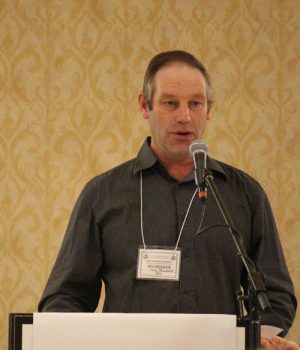LONDON — Three members of the Renfrew County National Farmers Union attended the 46th annual National Farmers Union convention held in London last week.
President Tony Straathof, secretary/treasurer Connie Tabbert and director Tim Tabbert attended the three day event.
The theme of this year’s event was Soil: Our Common Ground. There were various panel discussions and workshops on this theme.
Peter Eggers of Peace River Alberta talked about soil being agriculture’s foundation. He emigrated from Germany to Canada in 1980 and farmed conventionally until the 1990s, at which time he switched to zero-till. He took various programs which enabled him to mineral balance the soils on his farm. These solutions enabled him to convert the farm to certified organic, which now produces beef, lamb, grass seed, alfalfa seed, wheat and peas.
Gary Martens, a retired instructor from the University of Manitoba, Doreen Stabinsky, a professor at the College of the Atlantic and Blake Hall, a farmer in Alberta, spoke about Soil Interface.
There was also a panel discussion on Supply Management – threats, Opportunity and Challenges. This was provided by Bruce Muirhead, from the University of Waterloo; Patrick Groenwegen, co-owner of Limestone Organic Creamery and Scott Graham, chair of the Egg Farmers of Ontario.
In the afternoon, there was a panel of four young farmers who spoke about the critical issues for new farmers.
Farming’s Impact on Water – Regulations versus Best Management Practices was a panel discussion provided by Jeff Brice from West Perth Township, Mari Veliz from the Ausable Bayfield Conservation Authority and Reg Phelan, an organic farmer from Prince Edward Island.
The final panel was top soil builders, which included speakers, who are all farmers: Mr. Eggers, Alyson Chisolm, Ken Laing (horse powered farm only) and Larry Marshall.
The panel discussions were interesting, but it’s so much to take in all at once, said Ms. Tabbert. The two she found most interesting were about the critical issues for new farmers, who may not necessarily be young, and the top soil builders. Listening to how the farmers faced the issues head-on and overcame them is quite interesting, because we all deal with problems differently, she noted.
Ms. Tabbert noted the top soil builders panel was interesting, because she doesn’t know many farmers who use horse power only. It was interesting to see how Mr. Laing was able to accomplish so much by using horses only. She noted one of his biggest obstacles is finding equipment that can be horse-powered only.
A constitutional amendment the Ontario National Farmers Union has been trying to get passed for several years, finally received the nod, Ms. Tabbert said. The original constitution read that the executive shall appoint a member of the board from each member as the regional co-ordinator of that region. However, since Ontario elects its own co-ordinator, the membership felt the executive should not be able to appoint a member of the board.
The amendment passed and now there is no fear that the co-ordinator chosen by each region that elects its co-ordinator will not be accepted by the board, she explained.
Throughout the three days, various resolutions were put before the membership for discussion Of those, 16 were passed, Ms. Tabbert said. Some of those resolutions are: the NFU will advocate to all appropriate levels of government that food and nutrition becomes a core course for Grades 5 to 12 with an emphasis on local, environmentally responsible, healthy food; the NFU lobby federal and provincial governments to re-establish a new Green Cover Program to help Canadian farms overcome environmental extremes and improve the sustainability of livestock farms; the NFU lobby all levels of government to obtain cost-sharing funding that would enable producers to perimeter fence land that would be suitable for pasturing livestock, allowing producers to raise larger numbers of livestock; that the NFU oppose the federal government’s Bill C-51, and all related changes to laws, that infringe upon the human right to privacy and criminalize dissent; that the NFU pro-actively and vigorously promote to all farmers the importance of on-farm biodiversity to sustainable agriculture; that the NFU urges the government of Canada to immediately begin using the Bank of Canada as mandated, to provide essentially interest-free loans to all levels of government in Canada for infrastructure, social programs and debt retirement; and that the NFU petition the Federal Minister of Transport to mandate that all brush affecting line of sight at all public crossings, protected or not, be cleared to a minimum of one half kilometre on railway property.
There was also an election of the officers for the national board. All positions but one were acclaimed. In the election for 2nd Vice-President (Operations), Glenn Tait of Saskatchewan defeated Renfrew County president Tony Straathof by 12 votes.
Acclaimed were president Jan Slomp; Hilary Moore (Ontario) as NFU 1st Vice-President (Policy); Coral Sproule (Ontario) as NFU Women’s President; Toby Malloy (Alberta) as NFU Women’s Vice-President; Ayla Fenton (Ontario) as NFU Youth President and Dana Penrice (Alberta) as NFU Youth Vice-President.
Mr. Straathof is Region 3’s representative on the board.
The National Farmers Union was founded in 1969. It is a non-partisan, democratic, direct-membership family farm organization working for domestic and international policy environments that support small and medium sized farmers to be the primary producers of safe, healthy food in sustainable production systems.







![Kenopic/Smith Auction [Paid Ad]](https://whitewaternews.ca/wp-content/uploads/2018/10/advertising-100x75.jpeg)

